Introduction
Angkor derives from a Sanskrit word meaning ‘holy city’; ‘Wat’ in Khmer means ‘temple’. Angkor Wat, located 5.5 km north of the modern town of Siem Reap in northeast Cambodia represents a whole complex of wonderful temples and stonemasonry and artwork throughout this area. It is a UNESCO world heritage site and is one of the most important archaeological sites in South-East Asia besides being the single largest religious structure in the world, and surely one of the world’s wonders of art and architecture.
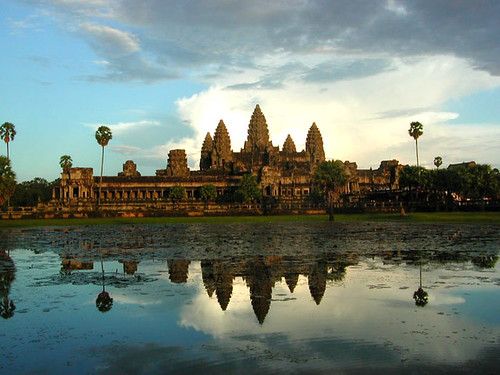
The temples of Angkor were built by the Khmer civilization between 802 and 1220 AD. From Angkor the Khmer kings ruled over a vast domain that reached from Vietnam to China to the Bay of Bengal. Within an area of 120 sq. miles, the ruins contain some of the most imposing monuments in the world, including about a thousand temples, mainly Hindu and some Buddhist; the ancient city, however, had an extent some three times that size, and was home to perhaps 750,000 people. The structures one sees at Angkor today, more than 100 stone temples in all, are the surviving remains of a grand religious, social and administrative metropolis whose other buildings – palaces, public buildings, and houses – were built of wood and have long since decayed and disappeared. Angkor Wat was re-discovered by a French man about 150 years ago among heavy forestry, ready to become one of the most visited archaeological and artistic sites on the planet.
History
The initial design and construction of Angkor Wat took place in the first half of the 12th century, during the reign of Suryavarman II (1113 – c. 1150). Dedicated to Vishnu, it was built as the king’s state temple and capital city. As neither the foundation nor any contemporary inscriptions referring to the temple have been found, its original name is unknown, but it may have been known as Vrah Vishnulok after the presiding deity. Work seems to have ended shortly after the king’s death, leaving some of the bas-relief decoration unfinished. In 1177, approximately 27 years after the death of Suryavarman II, Angkor was sacked by the Chams, the traditional enemies of the Khmer. Thereafter the empire was restored by a new king, Jayavarman VII, who established a new capital and state temple (Angkor Thom and the Bayon respectively) a few kilometres to the north.
In the late 13th century, Angkor Wat gradually moved from Hindu to Theravada Buddhist use, which continues to the present day. Angkor Wat is unusual among the Angkor temples in that although it was somewhat neglected after the 16th century it was never completely abandoned, its preservation being due in part to the fact that its moat also provided some protection from encroachment by the jungle.
The true history of Angkor Wat was pieced together only from stylistic and epigraphic evidence accumulated during the clearing and restoration work carried out across the whole Angkor site. There were no ordinary dwellings or houses or other signs of settlement including cooking utensils, weapons, or items of clothing usually found at ancient sites. Instead there is the evidence of the monuments themselves.
Angkor Wat required considerable restoration in the 20th century, mainly the removal of accumulated earth and vegetation. Work was interrupted by the civil war and Khmer Rouge control of the country during the 1970s and 1980s, but relatively little damage was done during this period other than the theft and destruction of mostly post-Angkorian statues.
The temple is a powerful symbol of Cambodia, and is a source of great national pride that has factored into Cambodia’s diplomatic relations with its neighbour Thailand, France and the United States. The splendid artistic legacy of Angkor Wat and other Khmer monuments in the Angkor region led directly to France adopting Cambodia as a protectorate on 11 August 1863. This quickly led to Cambodia reclaiming lands in the northwestern corner of the country that had been under Thai control since the Thai invasion of 1431 AD. Cambodia gained independence from France on 9 November 1953 and has controlled Angkor Wat since that time.
Angkor Wat Today
Since the 1990s, Angkor Wat has seen continued conservation efforts and a massive increase in tourism. The temple is part of the Angkor World Heritage Site, established in 1992, which has provided some funding and has encouraged the Cambodian government to protect the site. A survey found that around 20% of the devatas were in very poor condition, mainly because of natural erosion and deterioration of the stone but in part also due to earlier restoration efforts. Other work involves the repair of collapsed sections of the structure, and prevention of further collapse.
Angkor Wat has become a major tourist destination. In 2004 and 2005, government figures suggest that, respectively, 561,000 and 677,000 foreign visitors arrived in Siem Reap province, approximately 50% of all foreign tourists in Cambodia for both years. The influx of tourists has so far caused relatively little damage, other than some graffiti; ropes and wooden steps have been introduced to protect the bas-reliefs and floors, respectively. Tourism has also provided some additional funds for maintenance—as of 2000 approximately 28% of ticket revenues across the whole Angkor site was spent on the temples—although most work is carried out by foreign government sponsored teams rather than by the Cambodian authorities.
Architecture and Style
Angkor Wat is the prime example of the classical style of Khmer architecture—the Angkor Wat style—to which it has given its name. By the 12th century Khmer architects had become skilled and confident in the use of sandstone (rather than brick or laterite) as the main building material. Most of the visible areas are of sandstone blocks, while laterite was used for the outer wall and for hidden structural parts.
Angkor Wat is a unique combination of the temple mountain, the standard design for the empire’s state temples, the later plan of concentric galleries, and influences from Orissa and the Chola of Tamil Nadu, India. The temple is a representation of Mount Meru, the home of the gods: the central quincunx of towers symbolises the five peaks of the mountain, and the walls and moat the surrounding mountain ranges and ocean. Access to the upper areas of the temple was progressively more exclusive, with the laity being admitted only to the lowest level.
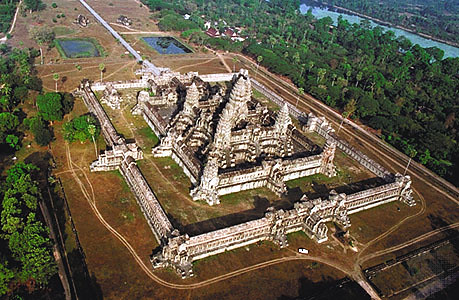
Angkor Wat has drawn praise above all for the harmony of its design, which has been compared to the architecture of ancient Greece and Rome. According to Maurice Glaize, a mid-20th-century conservator of Angkor, the temple “attains a classic perfection by the restrained monumentality of its finely balanced elements and the precise arrangement of its proportions. It is a work of power, unity and style.”
Features
Outer enclosure: The outer wall is surrounded by open ground and a moat. Access to the temple is by an earth bank to the east and a sandstone causeway to the west; the latter, the main entrance, is a later addition, possibly replacing a wooden bridge. The outer wall encloses a space, which besides the temple proper was originally occupied by the city and, to the north of the temple, the royal palace. Like all secular buildings of Angkor, these were built of perishable materials rather than of stone, so nothing remains of them except the outlines of some of the streets. Most of the area is now covered by forest.
Central structure: The temple stands on a terrace raised higher than the city. It is made of three rectangular galleries rising to a central tower, each level higher than the last. Each gallery has a gopura (a monumental tower, usually ornate, at the entrance of any temple) at each of the points, and the two inner galleries each have towers at their corners, forming a quincunx.
The outer gallery has pavilions rather than towers at the corners. The gallery is open to the outside of the temple, with columned half-galleries extending and buttressing the structure. Connecting the outer gallery to the second enclosure on the west side is a cruciform cloister called Preah Poan (the “Hall of a Thousand Buddhas”). This area has many inscriptions relating the good deeds of pilgrims, most written in Khmer but others in Burmese and Japanese. The four small courtyards marked out by the cloister may originally have been filled with water. North and south of the cloister are libraries.
Beyond, the second and inner galleries are connected to each other and to two flanking libraries by another cruciform terrace, again a later addition. From the second level upwards, devatas abound on the walls, individually or in groups of up to four. The second-level enclosure may originally have been flooded to represent the ocean around Mount Meru. Three sets of steps on each side lead up to the corner towers and gopuras of the inner gallery. The very steep stairways represent the difficulty of ascending to the kingdom of the gods. This inner gallery, called the Bakan, is a square with axial galleries connecting each gopura with the central shrine, and subsidiary shrines located below the corner towers. The roofings of the galleries are decorated with the motif of the body of a snake ending in the heads of lions or garudas.
Carved lintels and pediments decorate the entrances to the galleries and to the shrines. The tower above the central shrine rises above the ground; unlike those of previous temple mountains, the central tower is raised above the surrounding four. The shrine itself, originally occupied by a statue of Vishnu and open on each side, was walled in when the temple was converted to Theravada Buddhism, the new walls featuring standing Buddhas.
Decoration: Integrated with the architecture of the building, and one of the causes for its fame is Angkor Wat’s extensive decoration, which predominantly takes the form of bas-relief (is a projecting image with a shallow overall depth, for example used on coins, on which all images are in low relief) friezes. The inner walls of the outer gallery bear a series of large-scale scenes mainly depicting episodes from the Hindu epics the Ramayana and the Mahabharata. From the northwest corner anti-clockwise, the western gallery shows the Battle of Lanka (from the Ramayana, in which Rama defeats Ravana) and the Battle of Kurukshetra (from the Mahabharata, showing the mutual annihilation of the Kaurava and Pandava clans). On the southern gallery follow the only historical scene, a procession of Suryavarman II, then the 32 hells and 37 heavens of Hindu mythology.
On the eastern gallery is one of the most celebrated scenes, the Churning of the Sea of Milk, showing 92 asuras and 88 devas using the serpent Vasuki to churn the sea under Vishnu’s direction. It is followed by Vishnu defeating asuras (a 16th-century addition). The northern gallery shows Krishna’s victory over Bana and a battle between the Hindu gods and asuras. The northwest and southwest corner pavilions both feature much smaller-scale scenes, some unidentified but most from the Ramayana or the life of Krishna.
Sarah Widjaja and Saurabh Sud
* * *
Bibliography
1. http://whc.unesco.org/en/list/668
2. http://sacredsites.com/asia/cambodia/angkor_wat.html
3. http://en.wikipedia.org/wiki/Angkor_Wat
4. http://www.autoriteapsara.org/en/angkor/temples_sites/temples/
angkor_vat.html
5. http://www.devata.org/2010/01/angkor-wat-top-shrine-reopens-to-visitors/

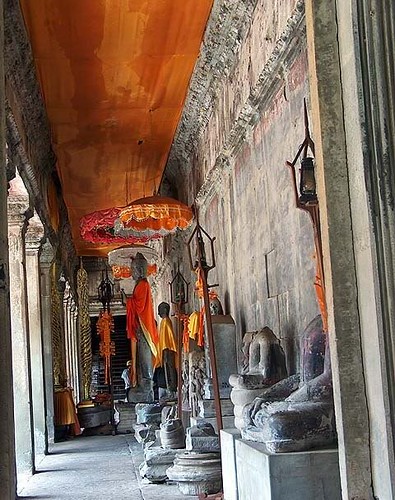
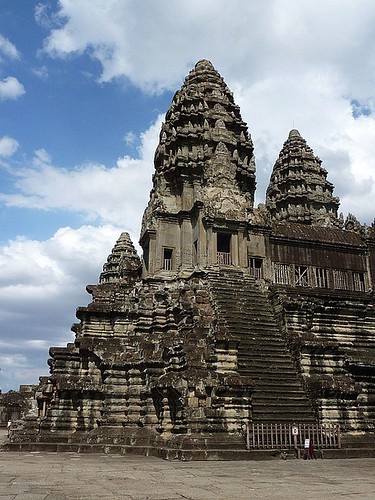
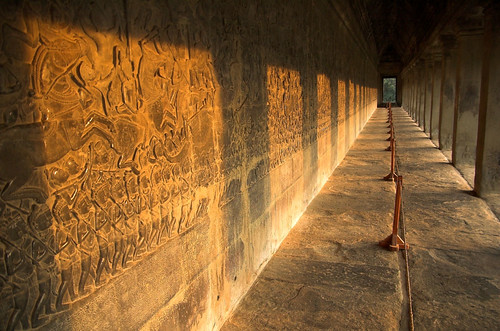
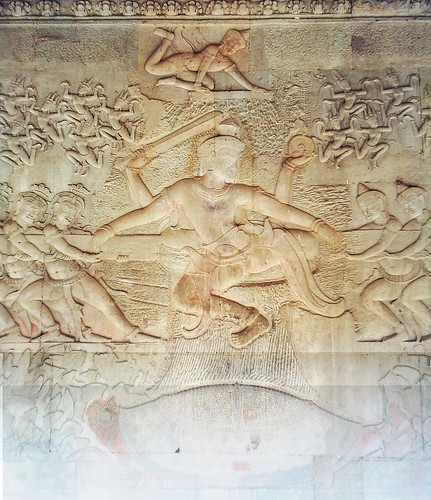
This really is besides a good quality apply for which i literally highly valued grasping. It’s not at all on a daily basis that we all put the opportunity to identify a thing. custom night guard
In this post comprehend the most important thing https://affordableassignments.co.uk/economics-assignments“>best Economics assignment help UK
that will provide you with any search term abundant website link a fantastic beneficial internet site site:
You have outdone yourself this time. It is probably the best, most short step by step guide that I have ever seen. bond cleaners brisbane
As I website possessor I believe the content material here is rattling wonderful , appreciate it for your efforts. You should keep it up forever! Best of luck. Salt trick for men
Oh my! an incredible article man. Thanks a lot Unfortunately I am experiencing issues with ur rss . Don’t know why I am struggling to subscribe it. Perhaps there is somebody getting identical rss issues? Anyone who can help kindly respond. Appreciate it Salt trick for men
I’d should check with you here. Which isn’t some thing I do! I like reading a post which will make people believe. Also, thank you permitting me to comment! Salt trick for men
A good blog always comes-up with new and exciting information and while reading I have feel that this blog is really have all those quality that qualify a blog to be a one. bkkbet
You could definitely see your enthusiasm within the work you write. The sector hopes for more passionate writers such as you who aren’t afraid to mention how they believe. All the time go after your heart. Salt trick for men
This time around Stu is getting married to a young Asian beauty named Lauren (Jamie Chung), who’s father completely disapproves of him. Salt trick for men
Oh my goodness! a great post dude. Appreciate it However I am experiencing problem with ur rss . Do not know why Unable to subscribe to it. Perhaps there is any person getting identical rss problem? Anyone who knows kindly respond. Thnkx Hitclub
Wonderful beat ! I wish to apprentice at the same time as you amend your site, how could i subscribe for a blog site? The account aided me a applicable deal. I had been tiny bit acquainted of this your broadcast provided vivid clear idea. data hk rekapan
on your|somebody who actually|the most effective|it is best to|simply would like to|actually answered my problem|There are some interesting Hitclub
Hmm it appears like your site ate my first comment (it was super long) so I guess I’ll just sum it up what I submitted and say, I’m thoroughly enjoying your blog. I as well am an aspiring blog blogger but I’m still new to the whole thing. Do you have any recommendations for novice blog writers? I’d certainly appreciate it. Hit club
I do agree with all the ideas you have offered to your post. They are very convincing and can definitely work. Still, the posts are very quick for beginners. Could you please extend them a bit from subsequent time? Thank you for the post. LIPOZEM
Rapidly this website may irrefutably end up being well-known amongst just about all running a blog individuals, due to the diligent content articles or even evaluations. https://dagasv368.net
I’d need to check with you here. Which isn’t some thing It’s my job to do! I like reading an article that will get people to feel. Also, appreciate your permitting me to comment! đăng ký hit club
I must say, as a lot as I enjoyed reading what you had to say, I couldnt help but lose interest after a while. Its as if you had a good grasp to the subject matter, but you forgot to include your readers. Perhaps you should think about this from far more than one angle. Or maybe you shouldnt generalise so considerably. Its better if you think about what others may have to say instead of just heading for a gut reaction to the subject. Think about adjusting your own thought process and giving others who may read this the benefit of the doubt. MITOLYN
Đăng ký BET88 là một nền tảng trò chơi trực tuyến phổ biến, cung cấp các dịch vụ đa dạng như thể thao, trực tuyến, xổ số, và các trò chơi giải trí khác. Với giao diện thân thiện, dễ sử dụng và hỗ trợ đa nền tảng, BET88 mang đến cho người chơi một trải nghiệm mượt mà và tiện lợi.
I’m not sure exactly why but this website is loading extremely slow for me. Is anyone else having this issue or is it a issue on my end? I’ll check back later and see if the problem still exists. Alpha bites
I’ve observed that in the world these days, video games are definitely the latest rage with kids of all ages. There are times when it may be extremely hard to drag your kids away from the video games. If you want the best of both worlds, there are lots of educational gaming activities for kids. Great post. lipozem
I have been exploring for a little bit for any high quality articles or blog posts in this sort of house . Exploring in Yahoo I at last stumbled upon this website. Reading this info So i am satisfied to show that I’ve a very just right uncanny feeling I found out exactly what I needed. I such a lot for sure will make sure to don’t disregard this site and provides it a look on a constant. Kerassentials
HappyToon 무료웹툰 : which has the largest number of webtoons currently being serialized. 무료웹툰
HappyToon 웹툰추천 : the fastest place to check free webtoon addresses. 웹툰추천
HappyToon 해피툰 : the fastest place to check free webtoon addresses. 해피툰
HappyToon 웹툰사이트 : the fastest place to check free webtoon addresses. 웹툰사이트
HappyToon 무료웹툰 : the fastest place to check free webtoon addresses. 무료웹툰
HappyToon 웹툰추천 : Introduction to the most popular free webtoons 웹툰추천
HappyToon 해피툰 : Introduction to the most popular free webtoons 해피툰
HappyToon 해피툰 : Introduction to the most popular free webtoons 해피툰
HappyToon 웹툰사이트 : Introduction to the most popular free webtoons 웹툰사이트
HappyToon 무료웹툰사이트 : Introduction to the most popular free webtoons 무료웹툰사이트
You understand your projects stand out of the crowd. There is something unique about them. It seems to me all of them are brilliant. Video Bokep
ما هي الاعتمادات التي تمتلكها الشركة؟ توضيح هذه الاعتمادات يمكن أن يعزز الثقة لدى العملاء المحتملين. شركة عزل فوم
The extremely quite possibly a decent deal that in actual fact extremely savored perusing. Isn’t really usual that have the option to check a given idea. hurghada excursions
هل يخاطب المحتوى فئة معينة من العملاء (مثل عشاق التقنية، المحترفين، أو المستخدمين العاديين)؟ تخصيص الخطاب يعزز التواصل مع الجمهور. بطارية راف باور متنقلة بسعة 14000 ملي امبير بقوة 30 واط بمنفذين تايب سي بي دي ومنفذ يو اس بي – اسود
There are particular dissertation online sites over the internet if you ever buy of course proclaimed in the site. SEO Experts in Singapore
There are particular dissertation online sites over the internet if you ever buy of course proclaimed in the site. get more details
Đăng nhập BET88 là một nền tảng trò chơi trực tuyến phổ biến, cung cấp các dịch vụ đa dạng như thể thao, trực tuyến, xổ số, và các trò chơi giải trí khác. Với giao diện thân thiện, dễ sử dụng và hỗ trợ đa nền tảng, BET88 mang đến cho người chơi một trải nghiệm mượt mà và tiện lợi.
DEBET tự hào mang đến danh mục trò chơi đa dạng từ cá cược thể thao đến casino trực tuyến, luôn cập nhật để đáp ứng nhu cầu người chơi.
Remarkable article, it is particularly useful! I quietly began in this, and I’m becoming more acquainted with it better! Delights, keep doing more and extra impressive! satta king
Asia99
Thanks for picking out the time to discuss this, I feel great about it and love studying more on this topic. It is extremely helpful for me. Thanks for such a valuable help again. 카지노사이트 추천
Casino SKY88 đẳng cấp với hàng trăm trò chơi trực tuyến, từ Baccarat, Poker đến Slot Games. Trải nghiệm thắng lớn ngay hôm nay!
Casino SKY88 đẳng cấp với hàng trăm trò chơi trực tuyến, từ Baccarat, Poker đến Slot Games. Trải nghiệm thắng lớn ngay hôm nay!
You will find on our sites distinctive no deposit bonuses,no deposit casino , no deposit poker , no deposit bingo , no deposit forex and all the most effective deposit bonuses MITOLYN
Hmm is anyone else encountering problems with the pictures on this blog loading? I’m trying to figure out if its a problem on my end or if it’s the blog. Any suggestions would be greatly appreciated. MITOLYN
I am very glad to know that your site is upgrading from the with simplest to more faster and synchronized form. I am quite familiar of a lot of sites since I work as a freelance writer and one of the sites that I find evolve is your site respectively. MITOLYN
This is certainly what is more a fairly superior blog post that many of us without doubt adored measuring. Not likely each and every day which unfortunately utilize the prospects to get yourself a system. برقکار شبانه روزی
Your work is truly appreciated round the clock and the globe. It is incredibly a comprehensive and helpful blog. Video Bokep
Once i actually inspire you to definitely recognize https://affordableassignments.co.uk/dissertation“>Cheap / affordable / best Dissertation help London
that phrase it is actually satisfaction determined.